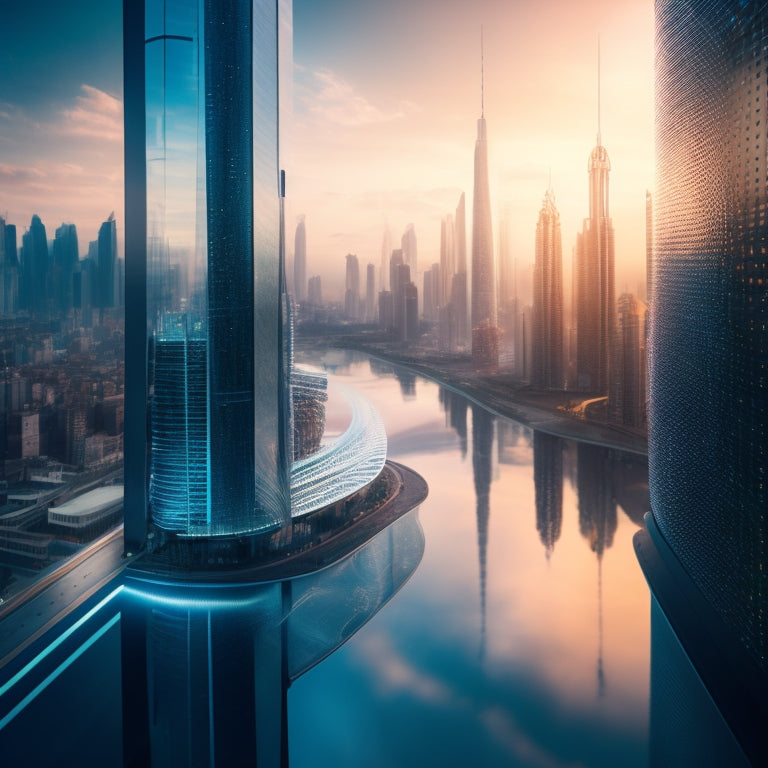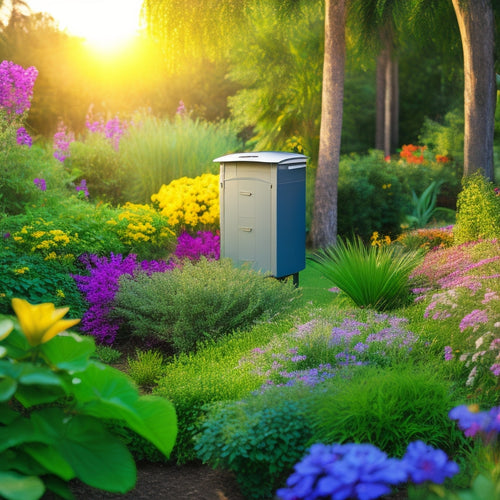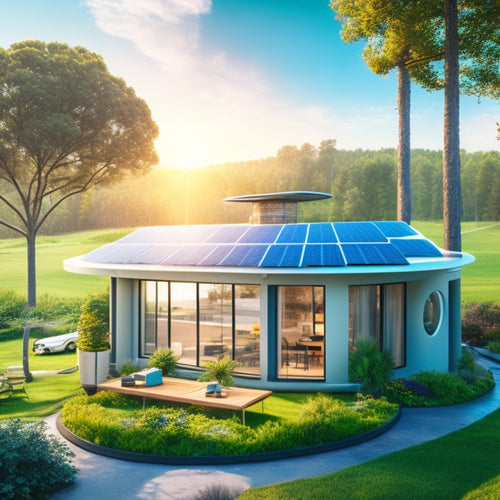
Smart Window Coatings: Boost Efficiency With Self-Cleaning Technology
Share
You're on the verge of unlocking the full potential of smart window coatings, which utilize self-cleaning technology to enhance energy efficiency, reduce maintenance costs, and promote environmental sustainability. These innovative coatings capitalize on hydrophobic and photocatalytic properties to maintain cleanliness, optimize natural light entry, and regulate thermal performance. By integrating renewable energy sources and minimizing environmental impact, you'll experience a significant reduction in energy consumption and carbon footprint. As you investigate further, you'll realize the full extent of benefits and possibilities that smart window coatings have to offer, revealing a future of sustainable building design and operation.
Key Takeaways
- Smart window coatings utilize hydrophobic and photocatalytic properties to maintain cleanliness and improve thermal performance, enhancing energy efficiency.
- Self-cleaning coatings reduce maintenance costs by eliminating the need for frequent cleaning, saving up to $500 per year.
- These coatings optimize natural light entry, reducing reliance on artificial lighting and minimizing heating and cooling needs.
- By integrating renewable energy sources, smart coatings contribute to a sustainable future, reducing carbon footprints and environmental impact.
- Energy consumption savings of up to 40% can be achieved through the improved thermal performance of smart window coatings.
How Self-Cleaning Coatings Work
When you apply a self-cleaning coating to a window, you're fundamentally giving it a superpower. This coating is engineered to exhibit hydrophobic properties, causing water to bead up and roll off the surface, taking dirt and grime with it.
But that's not all - the coating also utilizes the power of photocatalytic reactions. When exposed to UV light, the coating triggers a chemical reaction that breaks down organic matter, further aiding the cleaning process.
By leveraging renewable energy sources, such as solar power, buildings can reduce their carbon footprint and reliance on traditional energy sources.
Additionally, this collaboration of hydrophobic properties and photocatalytic reactions enables the window to maintain its transparency and clarity, unencumbered by dirt and grime.
As a result, you're left with a window that's not only cleaner but also requires less maintenance, giving you the freedom to focus on what matters most.
Energy Efficiency Benefits Explained
Your smart window coating's energy efficiency benefits are rooted in its ability to optimize the amount of natural light that enters your building while minimizing the amount of heat that escapes.
By allowing in natural light, you'll reduce your reliance on artificial lighting, which leads to significant energy savings. The coating's thermal insulation properties also prevent heat from escaping, reducing the need for heating and cooling.
Additionally, the UV protection built into the coating prevents harmful rays from entering your building, further reducing the load on your HVAC system.
As companies shift to renewable energy sources, such as solar and wind power, the importance of energy-efficient solutions like smart window coatings will continue to grow.
This results in a more comfortable and consistent indoor climate, while also reducing your energy bills and carbon footprint.
Reducing Maintenance Costs Long-Term
By applying a smart window coating, you can markedly reduce maintenance costs over the long term. Traditional window maintenance strategies, such as frequent cleaning and replacement, can be costly and time-consuming. Smart window coatings, on the other hand, offer a low-maintenance solution that can lead to significant long-term savings.
| Maintenance Strategy | Frequency | Cost |
|---|---|---|
| Traditional Cleaning | Quarterly | $500/year |
| Replacement | Every 10 years | $10,000 |
| Smart Window Coating | One-time application | $2,000 |
| No cleaning required | N/A | $0 |
| Extended window lifespan | N/A | $0 |
Environmental Impact of Smart Coatings
You're likely wondering how smart window coatings impact the environment.
By reducing the carbon footprint of buildings, these coatings can greatly contribute to a more sustainable future.
Additionally, the integration of renewable energy sources, such as solar power, can further minimize the environmental impact of buildings by reducing reliance on fossil fuels.
As you'll see, the benefits extend to energy consumption savings and the use of eco-friendly materials.
Carbon Footprint Reduction
The incorporation of smart window coatings into building designs has led to a significant reduction in carbon footprint, primarily due to their ability to regulate the amount of heat and light that enters a building.
By minimizing the need for artificial lighting and heating/cooling, you're reducing your reliance on non-renewable energy sources. This, in turn, leads to a decrease in greenhouse gas emissions and a lower carbon footprint.
Renewable energy systems, such as solar power fuel cost reductions, can further enhance the sustainability of buildings. Additionally, reducing reliance on fossil fuels leads to a smaller carbon footprint and enhances overall sustainability and environmental responsibility.
- Reduced energy consumption: Lower energy requirements mean fewer carbon emissions.
- Carbon offsets: The reduction in energy consumption can be offset against other carbon-intensive activities.
- Sustainable practices: Smart window coatings promote sustainable practices in building design and operation.
- Long-term environmental benefits: The reduced carbon footprint leads to a healthier environment for future generations.
Energy Consumption Savings
Nearly 40% of a building's energy consumption is attributed to heating, cooling, and lighting. By integrating smart window coatings into your building's design, you can greatly reduce this energy expenditure.
These coatings enhance thermal performance, allowing you to better manage energy consumption. In the summer, they reflect solar radiation, reducing the need for cooling. In the winter, they retain heat, minimizing the need for heating.
Additionally, incorporating renewable energy solutions like solar panels and green hydrogen fuel cells can further reduce reliance on fossil fuels and lower energy costs. This results in reduced energy consumption, leading to lower energy bills and a smaller carbon footprint.
Eco-Friendly Material Use
One significant advantage of smart window coatings is their eco-friendly material composition, which minimizes environmental impact.
You'll appreciate that these coatings are designed with sustainability in mind.
Here are some key features that set them apart:
-
Renewable resources: Many smart coatings are derived from renewable resources, reducing dependence on finite materials.
-
Biodegradable options: Some coatings are biodegradable, ensuring a lower environmental footprint at the end of their life cycle.
-
Low-VOC formulations: Smart coatings are often formulated with low volatile organic compounds (VOCs), minimizing indoor air pollution.
- Recyclable materials: Some coatings can be recycled, reducing waste and conserving natural resources.
Boosting Solar Panel Efficiency
Utilizing sunlight more efficiently is vital for maximizing solar panel performance. You can enhance your solar panel's efficiency by incorporating smart window coatings into your system.
These coatings reduce the amount of dust and debris that accumulates on the panels, allowing more sunlight to reach the photovoltaic cells. Regular solar panel maintenance is important to guarantee peak performance, and smart window coatings make this process easier.
With efficiency tracking, you can monitor your solar panel's performance in real-time, identifying areas for improvement. By integrating smart window coatings into your solar panel system, you'll be able to generate more power while reducing maintenance costs.
Comparing Coatings to Traditional Glass
When comparing smart window coatings to traditional glass, you'll want to contemplate the thickness of the glass, as it affects the coating's performance.
You'll also need to evaluate the clarity and light transmission of the coating versus traditional glass, as these factors impact its overall effectiveness.
Additionally, you should assess the weight and durability of the coating compared to traditional glass to determine which option best suits your specific needs.
Glass Thickness Matters
Frequently, designers and builders overlook a vital factor in their window design: glass thickness. You may think that all glass is created equal, but the reality is that glass thickness greatly impacts the performance of your windows.
Thicker glass provides better glass insulation, reducing heat transfer and energy loss. Here are some key benefits of optimizing glass thickness:
-
Improved energy efficiency: Thicker glass reduces heat transfer, keeping your home warmer in winter and cooler in summer.
-
Enhanced aesthetic appeal: Thicker glass can support larger, more expansive windows, creating a sleek, modern look.
-
Increased durability: Thicker glass is more resistant to breakage and damage, ensuring your windows remain secure and functional.
- Better soundproofing: Thicker glass reduces noise pollution, creating a more peaceful living environment.
Optimizing glass thickness is essential to revealing the full potential of your windows.
Clarity and Light Transmission
Your window's clarity and light transmission play a significant role in determining the ambiance and functionality of your living space.
Traditional glass can lead to glare and restricted views, affecting your comfort and productivity. Smart window coatings, on the other hand, offer superior light transmission and diffusion, ensuring exceptional clarity.
This results in a more pleasant and functional space, ideal for working or relaxing. With glare reduction, you can enjoy unobstructed views and reduced eye strain.
Additionally, smart coatings allow for precise control over light transmission, enabling you to customize the ambiance to suit your needs.
Weight and Durability
You've likely noticed the notable impact that smart window coatings have on the ambiance and functionality of your living space, particularly regarding clarity and light transmission.
Now, let's explore the weight and durability aspects of these coatings compared to traditional glass.
When considering weight, it's crucial to evaluate the following factors:
-
Material density: Smart window coatings are considerably lighter than traditional glass, reducing the overall weight of your windows.
-
Structural integrity: The coating's molecular structure guarantees it can withstand various environmental conditions without compromising the window's stability.
-
Frame material: The type of frame used can impact the overall weight, with smart window coatings often paired with lighter, more durable frames.
- Installation methods: The way the coating is applied and installed can affect the final weight, with modern techniques minimizing excess material.
Future of Sustainable Window Technology
By 2050, the global energy crisis is expected to worsen, and the need for sustainable solutions will become even more pressing.
You'll likely see smart materials playing a vital role in shaping the future of sustainable window technology. Future innovations will focus on developing coatings that not only reduce energy consumption but also utilize and convert environmental energy.
This could include integrating photovoltaic cells, thermoelectric materials, or even bio-inspired solutions that mimic nature's efficiency. As you look to the future, expect to see windows that don't just reduce energy consumption but also generate power, creating a net-positive impact on the environment.
With ongoing research and development, the possibilities for sustainable window technology are endless, and you can expect to see significant breakthroughs in the years to come.
Frequently Asked Questions
Can Smart Window Coatings Be Applied to Existing Windows?
You'll be interested to know that 70% of commercial buildings have inefficient windows. Now, can you apply smart window coatings to existing windows? Yes, using various application methods, such as spraying or rolling, and with minimal maintenance requirements, you can upgrade your windows for better energy efficiency.
Do Self-Cleaning Coatings Affect Window Transparency or Clarity?
When you apply self-cleaning coatings, you'll find they don't compromise window transparency or clarity, ensuring ideal transparency maintenance. In fact, the coating's longevity is directly tied to its ability to preserve crystal-clear views, giving you unobstructed freedom to gaze outside.
Are Smart Window Coatings Compatible With All Window Materials?
You're constructing a puzzle, and the pieces must fit seamlessly. When it comes to smart window coatings, you'll find they're compatible with most materials, but application methods vary, ensuring a harmonious marriage between coating and window, no matter the material.
Can Smart Coatings Be Used on Curved or Irregularly Shaped Windows?
You can apply smart coatings to curved or irregularly shaped windows, but it's essential to guarantee the coating's flexibility and adhesion properties match the window's unique curved application and irregular shapes to achieve the best performance and durability.
Do Smart Window Coatings Come With a Warranty or Guarantee?
You'll be delighted to find that top-tier smart window coatings typically come with a tranquilizing trifecta: a warranty that wraps you in protection, a performance guarantee that promises pristine results, and a duration that dutifully defends your investment for years to come.
Related Posts
-

Why Choose Solar Composting Toilets for Your Home?
By choosing a solar composting toilet for your home, you'll greatly reduce your environmental impact, slashing your w...
-

Gamify Your Home's Energy Generation and Savings
You're taking the next step in optimizing your home's energy generation and savings by utilizing the power of gamific...
-

10 Best Sustainable Waste Management Solutions for Green Homes
You're likely unaware that the average green home generates over 2 kilograms of waste daily, but with the right susta...


